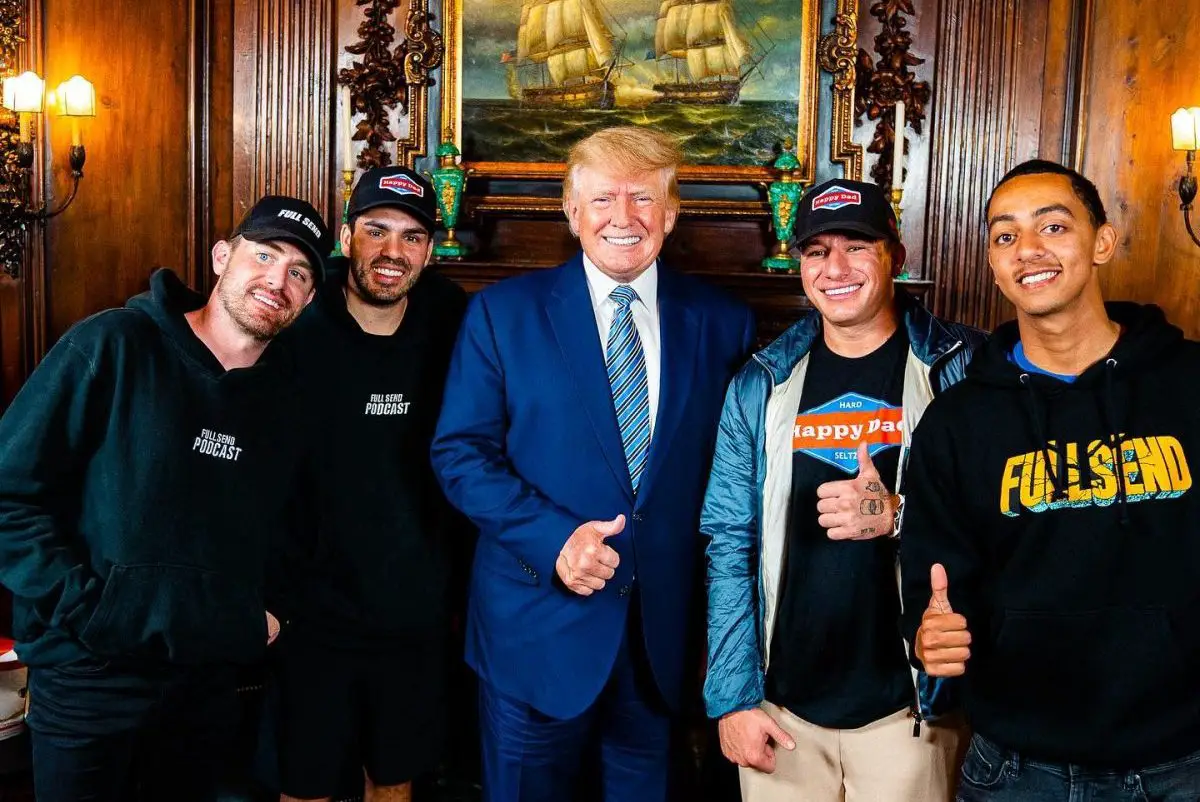After a prolonged absence from social media after losing the 2020 election, former President Donald Trump briefly returned to YouTube for an interview with the “Full Send” podcast and provided enough misinformation to make an informed listener’s head spin.
Before the last part of that sentence causes you to click away with political contempt, YouTube agreed and swiftly took the video down nearly 24 hours after its initial posting. YouTube also wrote a letter to “Full Send” co-host Kyle Forgeard explaining why the interview violated their misinformation policy.
“Content that advances false claims that widespread fraud, errors, or glitches changed the outcome of the U.S. 2020 presidential election is not allowed on YouTube.”
Forgeard shared YouTube’s explanation to his Twitter account and expressed his disappointment by simply writing “wow.” Former President Trump shared a similar disdain for YouTube’s decision and drafted a rather wordy press statement to address the matter.
“Incredibly, but not surprisingly, the Big Tech lunatics have taken down my interview with the trendy NELK boys so that nobody can watch it or in any way listen to it.” The 45th president continued, “In the 24 hours it was up, it set every record for them, by many times.”
The Nelk Boys indeed claimed the Trump interview garnered over 5 million views in 24 hours in a tweet, which is an impressive number that nearly quadruples the 1.3 million subscribers the podcast has on YouTube. Additionally, the massive number represents a strong desire to hear the former president speak, especially when public interest in politics has been heightened by the Ukraine-Russia conflict and the worrying rise of inflation.
Let’s begin with a productive and hopefully bipartisan conversation about misinformation and its heightened relevance in today’s political climate. Oxford Languages defines misinformation as “false or inaccurate information, especially that which is deliberately intended to deceive.” Recent news shows that it can also be a weaponized tool any political entity can use to achieve its central purpose. For example, regardless of which side you support, there’s no denying that citizens inhabiting both nations in the Ukraine-Russia conflict have experienced the consequences of disinformation as the war continues to unfold.
In Russia, it’s been reported the Kremlin has assembled troll armies to spread misinformation about the Ukraine conflict, leading Russian citizens to believe their forces are being greeted as liberators. In contrast, other Russians think the war isn’t happening past the Donbas region.
In Ukraine, the country’s official Twitter account spread disinformation when they tweeted the Ghost of Kyiv had become a nightmare for Russian skies. In reality, most footage showing him in action were movie clips from the video game Digital Combat Simulator World. This has led some analysts to claim that fantastical and exaggerated claims of Ukrainian success can harm the country if citizens are left without an accurate portrayal of real events.
Ukraine was probably aiming to artificially amplify Western support for its resistance and boost morale for its citizens with the misinformation campaign. Still, hopefully, the take-home message from the worldly example was this: Misinformation is bipartisan and knows no political affiliation. Political leaders around the world regularly share disinformation with the public in hopes of advancing their agenda, and Donald Trump is no exception.
While commonly used around the world, misinformation should still be regarded as dangerous since it can directly lead to the loss of human life. A recent American case study showcases the dangers of misinformation spread on January 6, 2021 — 10 Americans died due to a misinformation campaign spearheaded by Donald Trump.
With that incident in mind, the lack of regard for the truth on the “Full Send” podcast with Trump can be safely described as insane. The former president made several fabricated claims throughout the interview:
“If we talk about the election fraud, they will not cover it; three days ago, Wisconsin came out, and they may decertify their election because they found so much fraud and irregularities.”
Wisconsin will not be decertifying its election results. Insanely, Trump appeared to be further goaded into providing a dishonest answer by “Full Send” co-host Kyle Forgeard.
“Does it suck that you can’t say these things because of big tech censoring you, and things like that?” asked Forgeard, who maintained a pro-Trump attitude throughout the interview.
The constant flow of insanity on the “Full Send” podcast with Trump didn’t end with disinformation surrounding the election. As Trump was asked about how he sees the current Russian-Ukraine war unfolding, he instead launched into a personal vendetta against windmills.
“The windmills, they don’t work. They’re too expensive, they kill all the birds and ruin your landscape. Yet, the environmentalists love the windmills.”
Who said anything about windmills? No one, yet the former president was amazingly able to shoehorn his longstanding feud with the energy source that cost him $290,000 a couple of years ago into a broader discussion about the Russia-Ukraine crisis.
Those statements and false representations of the truth made the “Full Send” podcast an insane watch. With that being said, some credit should be given to co-hosts Kyle Forgeard and Bob Menery for making an apparent effort to keep the interview entertaining. Menery, who gained notoriety through his comedic commentary on live sporting events, asked interesting questions and got Trump to expound on his music taste.
“I have an aptitude for music. You know a song that does get people moving? You know what gets them rocking? ‘YMCA.’”
Despite these fun moments, it’s clear that society failed to benefit from the insanity of the “Full Send” podcast with Donald Trump. The constant stream of misinformation present throughout the interview intentionally manufactured partisanship. At the same time, the host’s failure to maintain objectivity resulted in the discussion being taken down in less than 24 hours. The events and consequences of January 6th, combined with the current misinformation war happening in Russia and Ukraine, highlight the need to fight against disinformation. The “Full Send” podcast with Donald Trump too often deviated from reality to be ethically allowed on a platform like YouTube.
















